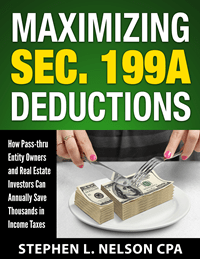If you’re a real estate investor, you’ve probably already wondered whether you get a real estate investor Sec. 199A deduction. (You maybe do.) And then also how the deduction works. (Er, it’s complicated.)
Accordingly, in this post I explain how the Section 199A deduction works for real estate investors. And when it doesn’t work.
Note: This blog post has been updated for the phase-in deduction limits as of 2025.
How Real Estate Investor Section 199A Deduction Works
Starting in 2018, the Section 199A deduction allows taxpayers to add a tax deduction to a return tentatively equal to 20% of their qualified business income.
Because qualified business income potentially includes net rental income from real estate investments, some real estate investors (even small investors) should get the deduction.
For example, if you make $10,000 a year off of a rental, you could get a $2,000 deduction. And if you make $100,000 a year off of a rental, you could get a $20,000 deduction.
The accounting is more involved than you might at first hope, however. For example, you need to include any depreciation in your accounting. (So you don’t look at cash flow, but at what your tax return shows.)
Further, you don’t include capital gains or income treated like capital gains (such as from the sale of a piece of real estate) in your qualified business income.
And then you need to look at the character of your real estate investment activity.
Limits on Real Estate Section 199A Deduction
Confusingly, for direct real estate investment folks, tax law limits the size of the actual Section 199A deduction a taxpayer gets.
Most of these limitations shouldn’t apply to small real estate investors. Nevertheless, let’s go through them one by one.
Taxable Income Limitation
First, your real estate Section 199A deduction can’t exceed 20% of your taxable income less net capital gain and qualified dividend income.
For example, suppose your taxable income equals $50,000 and that amount includes no capital gains or losses. Further suppose that your real estate qualified business income equals $100,000.
In this case, you don’t get a deduction equal to 20% of that $100,000. You get a deduction equal to 20% of the $50,000.
Wage and Property Limitations
Another limit. If your income exceeds $247,300 and you’re single, or exceeds $494,600 and you’re married, your real estate Section 199A deduction can’t exceed the greater of these calculated amounts:
50% of your W-2 wages from inside the real estate business
Or
25% of your W-2 wages from inside the real estate business plus 2.5% of the original purchase you paid for the depreciable part of the real estate (so everything but the land).
Understanding the Phase-out Range
There’s a phase-in range that runs from $197,300 to $247,300 for single taxpayers and from $394,600 to $494,600 for married taxpayers. Within the phase-in range, W-2 wages and depreciable property sort of matter. (See our blog post, Section 199A Phase-out Deduction Calculations for details.)
Below the phase-in range, wages and depreciable property don’t matter at all.
An Example of How the Limitation Formulas Work
But back to the W-2 wages and depreciable property limitations. Suppose your taxable income exceeds $247,300 and you’re single, or $494,600 and you’re married, and that you owe a property that generates $150,000 a year in rental income.
Tentatively, you get a $30,000 deduction because 20% of $150,000 equals $30,000.
However, that deduction needs to be compared to your “real estate business” wages and your depreciable property.
If you have $40,000 of wages (most real estate investors don’t employ W-2 workers for their investments) and the original cost of depreciable part of the real estate investment equals $600,000, you calculate two amounts:
50% of the $40,000 of wages, which equals $20,000
and
25% of the $40,000 wages plus 2.5% of the $600,000, which equals $25,000
In this case, the 25% of the wages plus 2.5% of the original depreciable property produces a higher value, $25,000. And because that $25,000 is less than the $30,000 tentative Sec. 199A deduction, the investor gets limited to $25,000.
New Real Estate Investments Usually Not Limited?
The depreciable assets stuff probably doesn’t limit the Section 199A deduction in the early years of an investment.
For example, say you buy a $1,000,000 property and calculate the depreciable part (so not the land) equals $800,000.
If you have no wages, the Section 199A deduction could get limited to $20,000 or 2.5% of the $800,000. But that’s probably not a real limit.
A $20,000 real estate Section 199A deduction would be the deduction you get on $100,000 of rental income (because $20,000 equals 20% of $100,000.)

However as another example, if you fast forward three decades and now your $1,000,000 property is a $3,000,000 property (simply due to average inflation), maybe you do hit the limit. Especially if you’ve fully depreciated the property and paid off the mortgage (which push up the net rental income).
More Details about the Depreciable Assets
Three other things to note, too, about the depreciable assets and depreciation stuff.
First, you include depreciable assets in your calculations for either ten years or through the last full year of depreciation—whichever is longer.
For example, some item you depreciate over five years (like maybe appliances)? You include that stuff for ten years in the calculations.
And then longer lived assets which usually provide only a partial last year of depreciation probably don’t get included in the calculations for their full depreciable life. A residential 27.5-year property, for example, matters only for the first 27 calendar years during which you own the property.
Second, how taxpayers factor into their qualified business income the part of any real estate profits that represent recaptured depreciation and appreciation gets a little complicated. You include gain or loss treated as ordinary income. But you exclude gain or or loss treated as capital gain or loss. And you also exclude unrecaptured Sec. 1250 gain (which is the gain that reflects past depreciation on the building).
Third, you look at the depreciable assets at the end of the year. For example, if you sell your rental property on December 15th and so hold no property on December 31st, your depreciable property value equals zero. (This would be something to consider when timing the sale of a property that produces qualified business income if you’re subject to the limitation requirement.)
Trade or Business Requirement
One esoteric wrinkle here: An investor’s real estate activity generally needs to rise to the level of a trade or business.
Without getting too far into the weeds, this requirement means the real estate investor needs to engage in her or his real estate investment activity with “regularity.” With “continuity.” And acting from a “profit motive.” Further, the activity can’t be “sporadic” and can’t be in truth a “hobby.”
A very readable Supreme Court case, Groetzinger, sets out the logic and rules for this trade and business stuff. But let me share a handful of comments about how the trade-or-business stuff applies to real estate investors. (And I’ll note my thinking on this has changed over time.)
First, if you’re intentionally investing in real estate to build wealth? In other words, if you’re clearly not an accidental landlord? I think you probably qualify as a Section 162 trade or business.
Note: I describe the safe harbor rules as well as the Section 162 “standard” in greater detail here: Section 199A Rental Property Trade or Business Definition.
A second thought… Any taxpayer who regularly works on their rental properties or who employs someone (either as W-2 employee or 1099 contractor) to make repairs or deal with tenants should meet the “regularity and continuity” requirement.
Third, vacation rental properties with short-term renters coming and going surely rise to the level of a trade or business as long as the investor activity isn’t “sporadic.” (This approach sort of meshes with the Section 469 statute language that says if you’re renting to people for 7 days or less on average, the activity is no longer a rental activity.) But interestingly, if a vacation rental property gets used by the owner, that property isn’t eligible for the safe harbor treatment.
Exception to the General Rule
I should mention another thing. One exception exists to the requirement that someone’s real estate activity needs to rise to the level of a trade or business for Section 199A.
Quoting from the preamble, the proposed regulations say this:
Solely for purposes of section 199A, the rental or licensing of tangible or intangible property to a related trade or business is treated as a trade or business if the rental or licensing and the other trade or business are commonly controlled under proposed §1.199A-4(b)(1)(i).
In other words, if you own a building you rent to your business, that rental activity counts as a trade or business. Even if you don’t function as a real estate investor with “regularity and continuity.”
Other Related Section 199A Deduction Articles
The Section 199A deduction interacts–and not in a good way–with the Section 1031 like-kind exchange exclusion. To learn more, check out this post: The Section 199A Section 1031 Conundrum.
If you’re still getting up to speed? A general primer: Pass-thru Income Deduction: Top 12 Things Every Business Must Know.
If you use an S corporation, peruse this article: S Corporation Shareholder Salaries and Section 199A Deduction.
Real estate brokers and agents may find this discussion useful: Sec. 199A Pass-thru Deduction and the Principal Asset Disqualification.
The current version of the Section 199A deduction expires at the end of 2025. But the proposed Big Beautiful Tax Bill creates a new version of the Section 199A deduction starting in 2026. This blog post explains that new deduction: The New Big Beautiful Section 199A Deduction. You can also experiment with our Big Beautiful Section 199A Deduction Calculator to see how the new calculations work.

My primary concern……..Schedule E will become treated as Schedule C and Schedule F for self-employment tax purposes. I will not be surprised to see the Regs say ‘if you want Sec 199A for your Schedule E, then you get SE tax the same as C and F’.
Hi Jeffrey, First, thanks for dropping by… always appreciate your comments in our linkedin group.
Second, regarding making Schedule E income subject to SE taxes, gosh, that would shock me. The House seemed pretty explicit that they didn’t want to expand the SE tax base when they were writing the law. Further much of the stuff that’s qualified business income is specifically not SE earnings: REIT dividends, publicly traded partnership distributive shares, S corporation income, etc. It would seem to me to be a massive edit of the statute (and a shrinking of the benefit Congress intended) to change the rules for SE taxes.